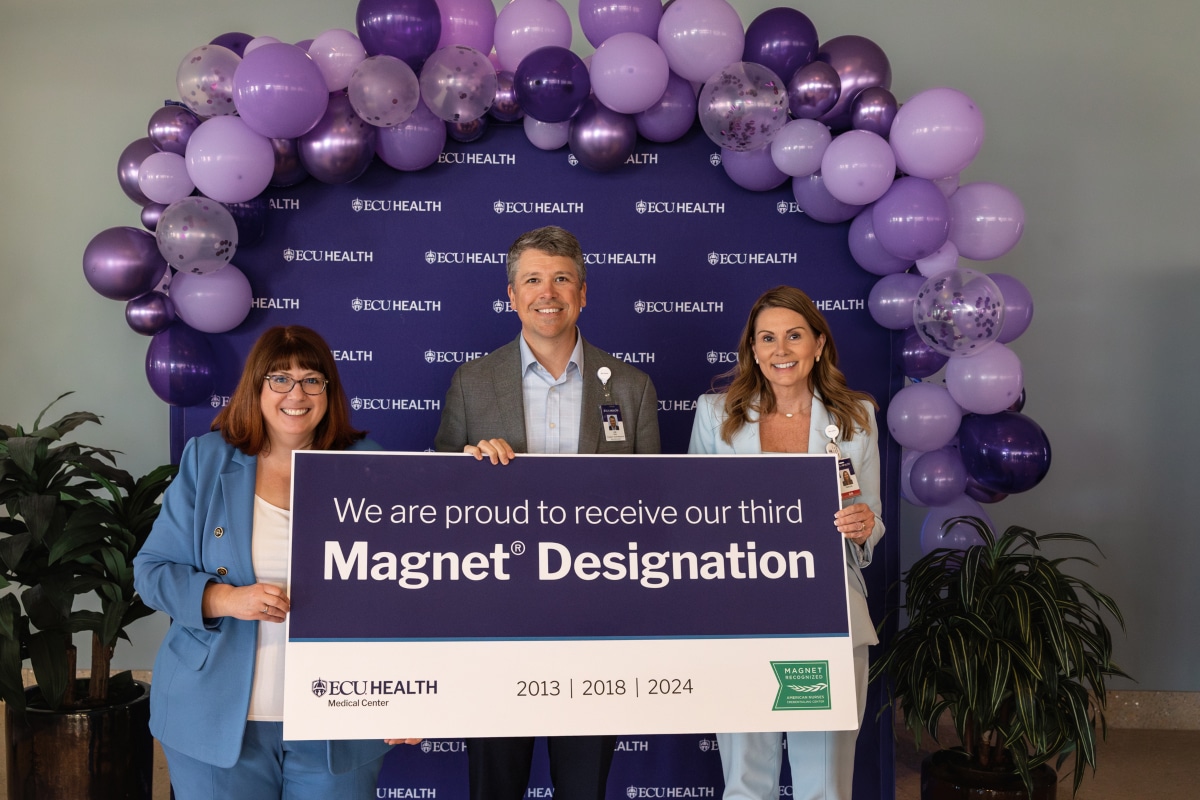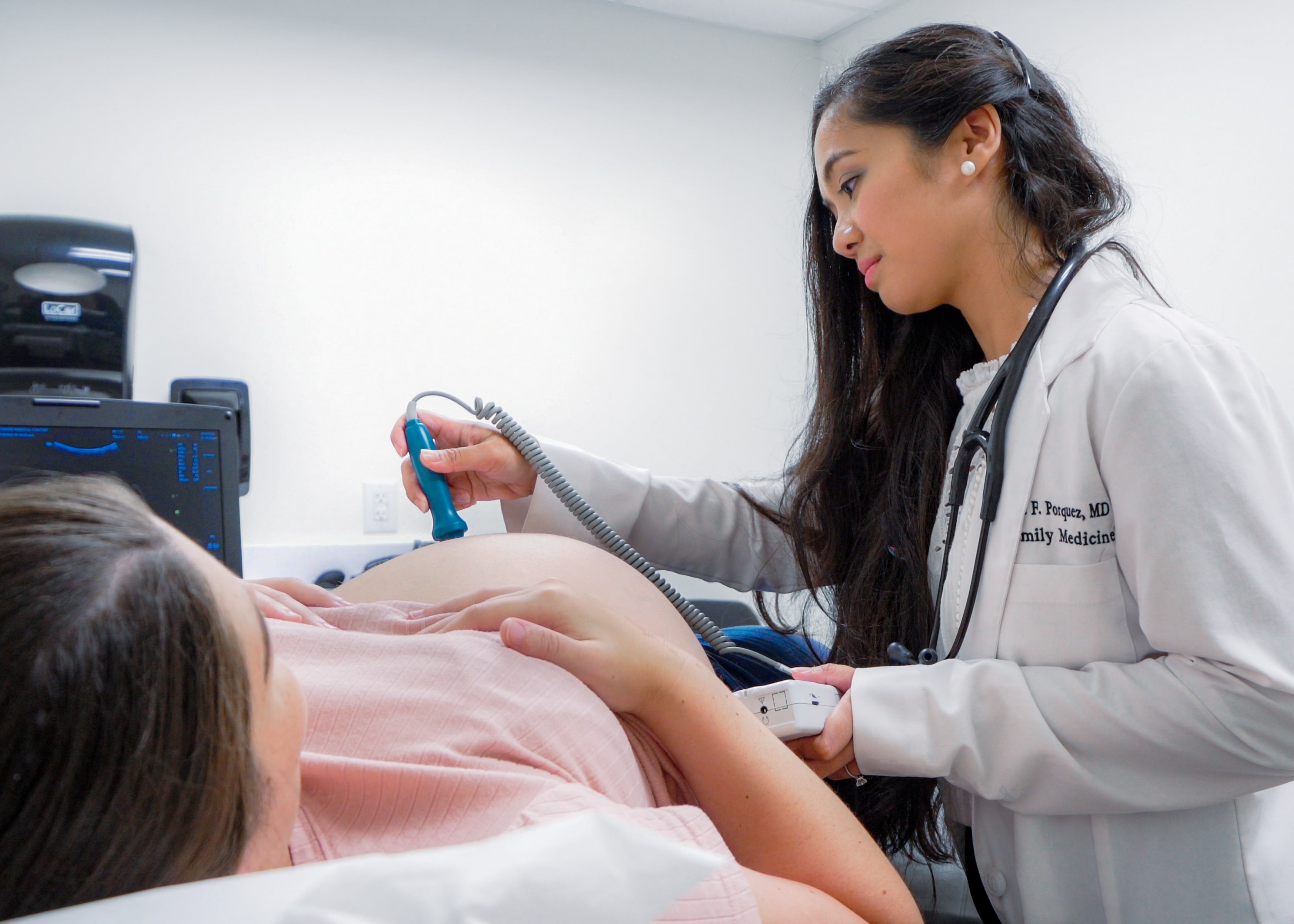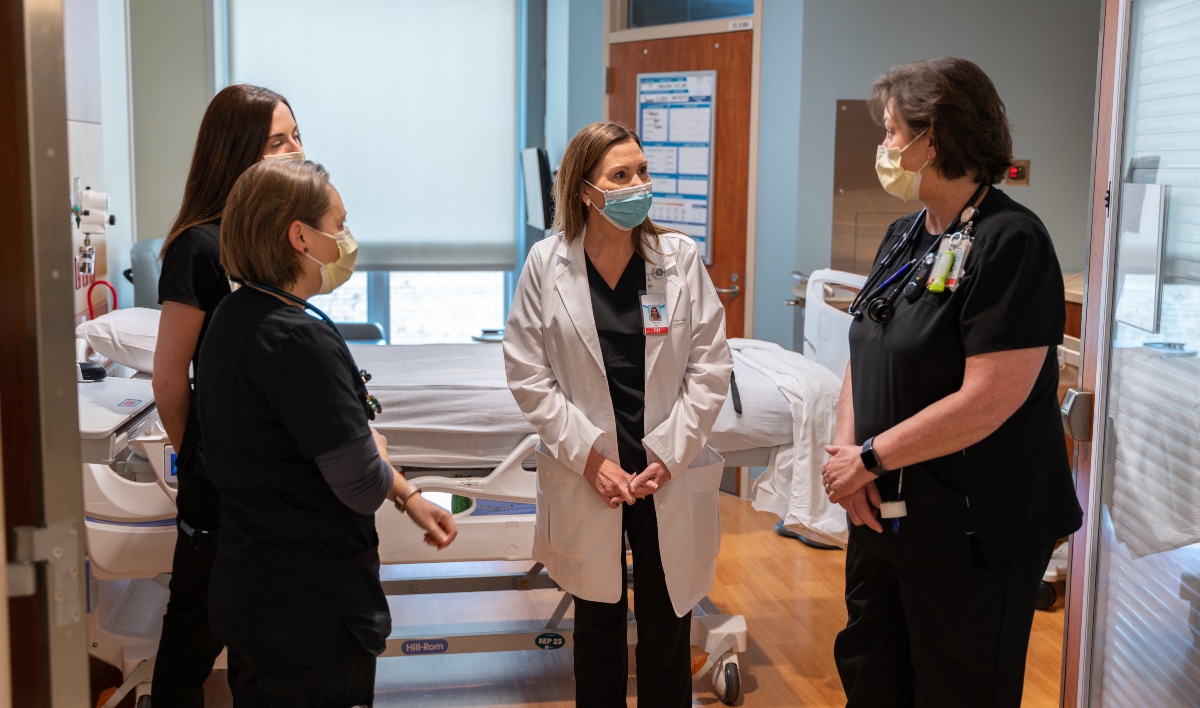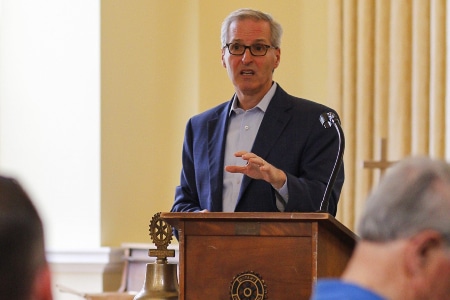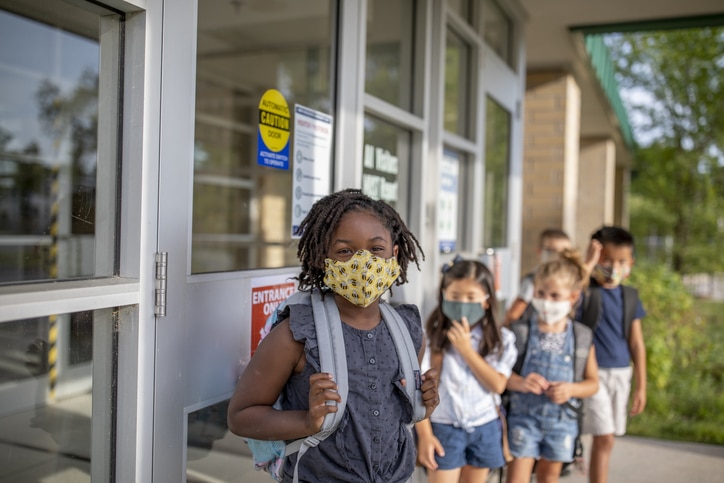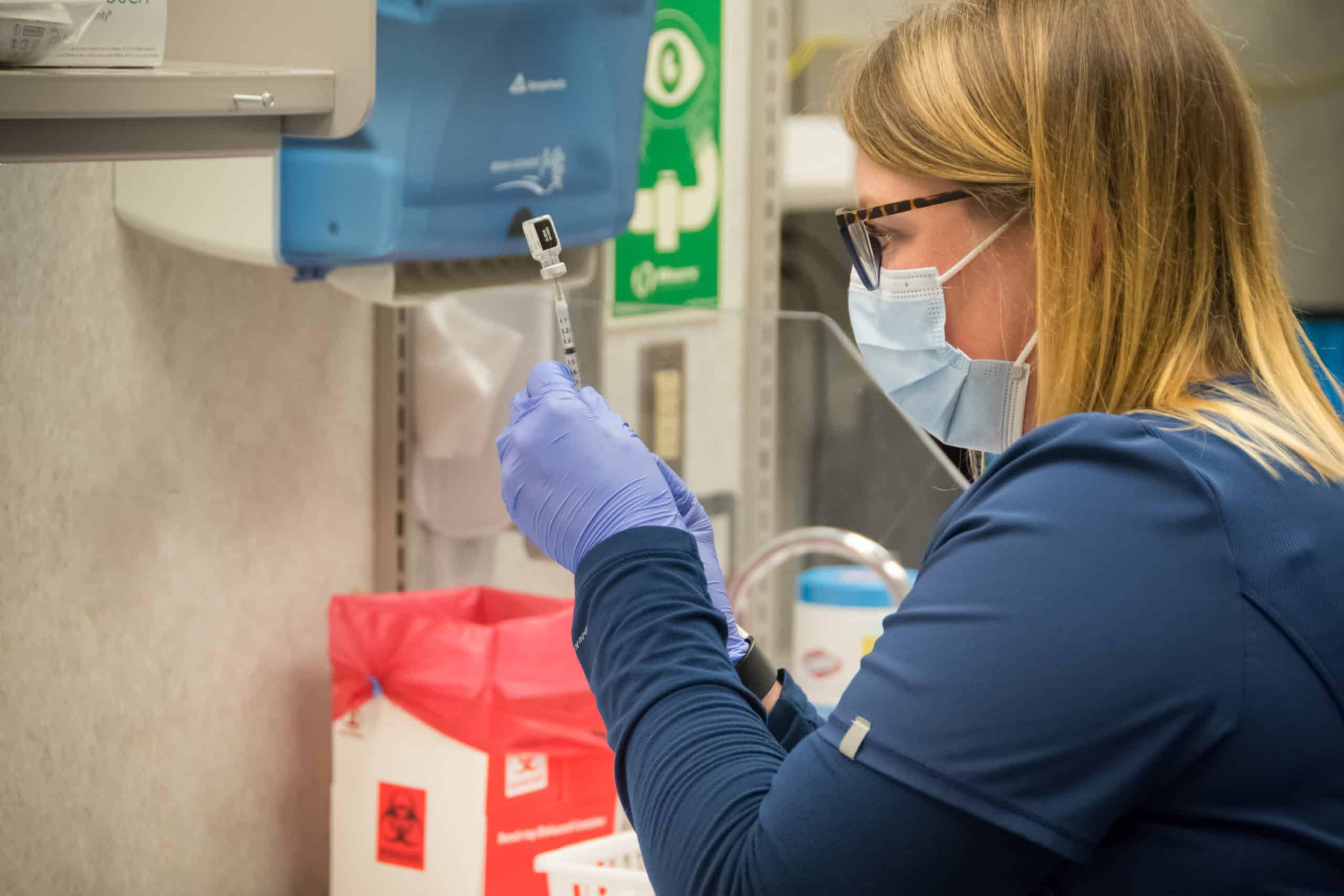
Dr. Jacob Pierce
Fall is upon us, and along with the cooler weather and changing leaves, we are expecting to see an increase in respiratory viruses. While it might be too late for ECU football’s conference championship dreams, it’s not too late to increase your chances of staying healthy this respiratory viral season. Respiratory viruses may be an inconvenience for many of us, but they can be devastating for those with certain conditions. Fortunately, vaccines and treatments are available for the major respiratory viruses expected to be circulating this Fall and Winter.
Testing positive for influenza, COVID-19, RSV and other respiratory viruses can be unsettling, but it’s important to remember that we’re equipped with the knowledge and tools to handle it effectively. If you test positive, reach out to your health care provider immediately. For those who are a bit more vulnerable—like older adults, people with underlying health conditions or a weakened immune system—getting early treatment really makes a difference. It can help keep symptoms from getting worse and get you back on your feet faster.
Medications available today for some respiratory viruses like COVID-19 can significantly reduce the severity of symptoms and lower the risk of hospitalization. As an infectious disease physician at ECU Health, I have seen firsthand how devastating these respiratory viruses can be for at-risk individuals. This underscores the importance of acting quickly and taking advantage of these treatments when eligible.
Treatment is just one part of the equation; preventative measures remain as vital as ever. The 2024–25 COVID-19 and influenza vaccines are available this Fall, and staying up to date with vaccinations is one of the most effective ways to protect yourself and those around you. We also now have FDA-approved RSV vaccines for all adults ages 75 years and older. The Centers for Disease Control and Prevention (CDC) also recommends the vaccine for adults ages 60-74 years who are at increased risk of severe RSV.
It is important to recognize that some of the most vulnerable in our community – such as newborns or individuals on chemotherapy don’t have a strong enough immune system for vaccines to work. They rely on the healthy among us to get vaccinated and keep them safe. I know that some of you reading this may have concerns about vaccinations. I encourage you to discuss which vaccines might be right for you with your health care provider. I get my vaccines every year, not to protect myself, but to protect anyone in our community who cannot get them for whatever reason.
Additionally, basic hygiene practices, like frequent handwashing, avoiding close contact with sick individuals and wearing masks in crowded or high-risk areas, continue to be simple yet powerful tools in preventing the spread of respiratory viruses.
By staying informed, acting quickly when needed and embracing preventive measures, we can navigate this season safely and protect the health of our community. It’s not just about avoiding illness; it’s about doing our part to ensure the well-being of those around us. Together, we can make a difference in managing this year’s respiratory viral season and look forward to baseball season.
Dr. Jacob Pierce is the medical director of infection prevention at ECU Health and a clinical assistant professor at the Brody School of Medicine at East Carolina University.
It is no secret that ECU Health’s mission to improve the health and well-being of the region is directly tied to the success of recruiting the best providers, nurses and care teams. The ongoing labor shortage makes it more important than ever to have a compelling reputation that attracts a talented workforce committed to eastern North Carolina.
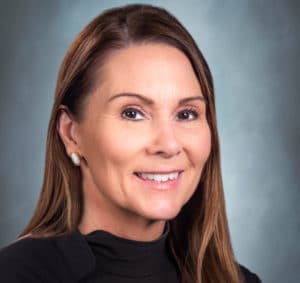
Trish Baise, ECU Health Chief Nursing Executive
During my first year at ECU Health as chief nursing executive, my team and I set out to gain a deep understanding of ECU Health nursing. The goal was to highlight and leverage the incredible strengths while also identifying the work needed to create and sustain a culture of nursing excellence. Our commitment is to ensure the organization fosters an environment where nurses can flourish, grow professionally and have a meaningful nursing experience while providing safe and highly reliable human-centered care.
This challenging work has already resulted in important achievements that affirm our standing as a world-class nursing organization. Most recently, ECU Health Medical Center achieved Magnet recognition – the highest national honor for exemplary nursing practice – for the third consecutive time, highlighting our commitment to creating a nursing ecosystem that embodies excellence. Less than 10% of hospitals in the United States have Magnet designation and ECU Health Medical Center is one of only eleven in North Carolina.
This achievement is the celebration of our collaborative work, but it is not the destination. We are just beginning our efforts to propel nursing at ECU Health to unprecedented heights, making it adaptable to the ever-changing health care industry.
The Path Forward for ECU Health Nursing
We are taking bold steps forward. At ECU Health, we are not just reacting to the future of nursing, we are defining it. We are co-designing an empowering environment for our nurses to innovate and excel, enhancing patient care, and setting a new standard for nursing excellence in rural health and beyond.
At the core of this work is an inclusive approach to re-imagining and elevating nursing at ECU Health we have named Advancing Nursing Practice and Excellence (APEX). It began as a broad research project, capturing the voices of our nurses across the entire health system to ensure we had a deep understanding and appreciation for our environment. We are using the information gained during this research to inform our nursing strategic plan and design the work ahead, ensuring our nurses are a part of it every step of the way.
APEX will be the model for nursing excellence, innovation, research and education in rural health and beyond. Unifying leadership, technology and evidence-based practices, APEX exemplifies the future of human-centered care.
Investing in Future Nurses
In addition to our APEX work, we are committed to strong partnerships and innovative collaborations alongside our academic partners in the region including East Carolina University and local community colleges to offer training programs for the next generation of health care professionals. Our nationally accredited Nurse Residency Program empowers graduate nurses to select from various clinical areas, aligning with their professional aspirations. Our structured, evidence-based program pairs new nurses with experienced mentors, fostering skill refinement and growth. Upon completion, participants gain practical experience, enhance critical thinking, and transition confidently into their nursing careers.
What This Means for Our Communities
Through our APEX work, ECU Health is cultivating a thriving nursing environment empowered and engaged to lead innovations that support improved quality of patient care and enhanced patient experience for those across our region. Together, with our nurses, we will be publishing our work – sharing the unprecedented work taking place in eastern North Carolina as we create the national model for rural health nursing excellence.
Our Magnet recognition is a reminder of ECU Health’s long-standing legacy of nursing excellence, and we are proud to propel that legacy into the future with these continued efforts. Additionally, our nurse residency program will play a vital role in training the next generation of nurses. By contributing to a healthier, more resilient community with improved health outcomes, we embody the state motto of North Carolina,“Esse quam videri,” which means “To be, rather than to seem.” This marks only the beginning of an incredible journey of continuous improvement and innovation for ECU Health. I take immense pride in our new strategic direction for nursing and feel privileged to collaborate with the best nurses in the country.
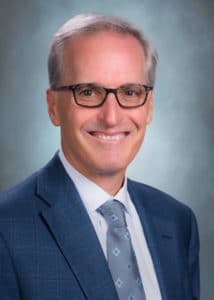
Dr. Michael Waldrum
For those of us fortunate enough to be involved in rural health care, the third Thursday of November is a special time to pause, reflect and look forward. Designated as National Rural Health Day in 2011, this particular Thursday has served as an important moment to honor the contributions of rural health care workers, including the 14,000-plus ECU Health and Brody School of Medicine at East Carolina University team members who care for eastern North Carolina.
You don’t have to look far to see the impact of rural health care. All around us are doctors, nurses, allied health professionals, professors, students and others who make high-quality health care possible here in eastern North Carolina. Today is a day to celebrate them and their tireless dedication to serving a region of 1.4 million people.
ECU Health’s vision to become the national model for rural academic health care is necessitated by the shared challenges rural communities across America face. An estimated 62 million people call rural America home, and they all experience health care in similar ways: fewer resources, higher burdens of diseases like diabetes and heart disease, difficulty accessing care and a higher number of under and uninsured people when compared to urban communities. Eastern North Carolina is no different.
These are undoubtedly complex challenges, but they can be solved through innovation and ingenuity. For example, the American Association of Medical Colleges estimates a shortage of more than 124,000 physicians by 2034, a reality that will disproportionately impact rural communities. We can anticipate the impending shortage, understand the disproportionate impact it will have on our communities and utilize the unique resources available at our academic health system to address these challenges.
Studies show that family medicine residents who spent 50% or more of their training time in rural settings were at least five times more likely than residents with no rural training to practice in a rural setting. Brody and ECU Health together launched the Rural Family Medicine Residency program in 2021, and the results are immediately evident with multiple residents already committed to continue practicing in one of ECU Health’s rural family medicine clinics.
There are countless other examples like the Rural Family Medicine Residency program that showcase the value of an academic and health care delivery system. When we created ECU Health, the vision was to create a premier academic health care enterprise that could serve as a national model for other rural health systems to learn from. We are on our way to realizing that vision, and I am proud of our work so far. Our progress would not be possible without the incredible team members who have dedicated their careers to improving the lives of others.
I encourage our community members to thank a health care worker this week. Our lives are better because they choose to serve here in rural eastern North Carolina.
Resources
Rural Family Medicine Residency Program
Rural Family Medicine Residency Program takes unique approach to training physicians

Trish Baise
Since my arrival to the organization in January, I have enjoyed the privilege of getting to get to know the nurses of ECU Health. I’ve visited our acute care environments and interacted with a number of ambulatory care teams. In every visit, I come away inspired by the level of nursing care that is provided on a daily basis in communities across eastern North Carolina.
This week, May 6-12, is National Nurses Week, and it is my distinct honor to recognize and celebrate the incredible contributions of our ECU Health nurses. They demonstrate the mission, vision and values of ECU Health by providing excellent care in our hospitals and clinics. Nurses also serve in other critical roles across our health system focused on improving well-being, quality, safety, outcomes and access.
All nurses, regardless of their role, have a profound connection to purpose. Our purpose might be to provide hope to the hopeless, administer life-saving care that impacts generations of a family, give the support a colleague needs at just the right time, teach the next generation of nurses or be a part of innovation that fundamentally changes health care. If we pay attention, our careers our filled with daily moments of purpose, some small, some life changing. Our nurses are joined in purpose by 4.2 million nurses nationwide. It is the tie that binds us together. Together we will build upon our shared purpose as ECU Health nurses and become a national model for nursing excellence.
During National Nurses Week and beyond, I encourage our community to take the time to celebrate each and every one of the nurses providing care for our family, friends and neighbors. Nursing is the backbone of health care, and achieving the ECU Health mission would be impossible without them.
Thank you, ECU Health nurses, for your compassion, commitment to excellence and all you do for your patients and their families every day. ECU Health, our patients and our communities all benefit because you choose to serve eastern North Carolina.
Mental health in the United States has been an ever-escalating problem for many years that has now become markedly worse due to the COVID pandemic. Fear, anxiety and isolation stemming from the pandemic exacerbated depression, substance abuse and even the incidence of spousal abuse.
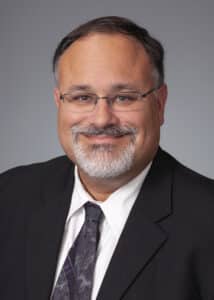
Dr. Michael Lang
In my role as chair of the Department of Psychiatry & Behavioral Health at the Brody School of Medicine and ECU Health, I have seen firsthand the impact a lack of mental health resources can levy on our most vulnerable citizens. Others in our community see and experience it as well, as evidenced by the large turnout and lively conversation at the Mental Health Town Hall hosted by the North Carolina Department of Health and Human Services in Greenville on Feb. 9. The themes and stories shared at the town hall were common, consistent and heartbreaking. I am grateful for the legislators and community members who came together to have an open, honest discussion and we all agree that urgent action is needed.
Emergency departments across the state are overrun with patients in psychiatric distress with few outlets available to provide them help. This has particularly been the case for patients with substance abuse disorders, our elderly and children. I personally have seen so many children in the emergency department that doctors had to treat other conditions in the waiting room. We owe our patients appropriate mental health services in a safe location with qualified professionals who are not only delivering excellent care but training the next generation of providers to take up the mantle of behavioral health care.
To that end, ECU Health’s partnership with Acadia Healthcare to build a new 144-bed freestanding mental health hospital here in eastern North Carolina is a step in the right direction. This facility, scheduled to open in 2025, will provide state-of-the-art care for not only the people of our region but also the entire state. The hospital will house distinct units that will be devoted to the care of specific populations of behavioral health patients. Included will be a geriatric unit, a substance abuse area, a space for those with significant co-morbid medical problems, the intellectually disabled and a 24-bed child/adolescent unit. Within its walls, every evidenced-based treatment available will be utilized to maximize our ability to rehabilitate, stabilize, and allow our patients successful community reentry.
Given the large number of disparate patients with varied diagnosis, the new behavioral health teaching hospital will serve as a training area for physicians, nurse practitioners, physician assistants, psychologists, occupational therapists, family therapists, substance abuse counselors and more. The hospital will be closely aligned with ECU Health Medical Center for access to the wide array of clinical and diagnostic resources our tertiary care center has to offer.
Our vision is for this facility to serve as a symbol of the commitment we at ECU Health and the Department of Psychiatry and Behavioral Medicine have to provide state of the art care for the people of eastern North Carolina. I am excited to form new partnerships and engage our community leaders to ensure that all citizens, whether they have schizophrenia or opiate use disorder, can live and prosper here in our wonderful region.
Michael Lang, MD, is chair of the Department of Psychiatry & Behavioral Health at the Brody School of Medicine and ECU Health.

Dr. Sy Atezaz Saeed
Contrary to popular belief, psychiatric disorders such as depression and post-traumatic stress disorder are just as common as other chronic conditions. About 11 percent of the U.S. population has been diagnosed with Diabetes, while in comparison 26 percent of the population has a diagnosable mental disorder per year.
Unlike other chronic conditions, there are few resources to treat mental illnesses in North Carolina, which is exemplified by the lack of behavioral health providers. Alarmingly, 42 out of 100 counties in the state have no psychiatrist or active behavioral health provider, leaving more than half of adults with mental illness without treatment options.
How did we get here?
In 2001, the state of North Carolina began to privatize mental health services by transitioning them from public area authorities to private provider groups. This transition meant private agencies would become solely responsible for caring for people with behavioral and mental health disorders as well as substance use disorders. For those without access to a local behavioral health professional or without the ability to pay for care, their only option is often the hospital emergency department (ED). In fact, one out of every eight ED visits is related to mental illness or substance use disorders. This puts more strain on EDs, which were not designed for this type of specialized care.
Working together
As a community, we need to work together to change the way behavioral health care is delivered in North Carolina. Solving the mental health crisis requires collaboration and partnership across a broad spectrum of services. One way ECU Health is doing this is through a joint venture partnership with Acadia Healthcare, a national leader in providing behavioral health services. Recently, we announced plans to build a state-of-the-art behavioral health hospital that is slated to open in spring 2025, pending regulatory approval.
In addition to serving adult patients, the new hospital will provide much-needed access to the behavioral health needs of children and adolescents, providing the only child and adolescent psychiatric beds within 75 miles of Greenville. Together, both ECU Health and Acadia will invest more than $60 million in expanding behavioral health resources.
Working in tandem with other partner organizations as a network providing a wide variety of treatment options can create a much greater impact than we’re able to on our own.
Everyone deserves access to high-quality health care, and ECU Health is committed to doing its part to offer vital behavioral health treatment to eastern North Carolina. While this partnership provides promise for those who are seeking behavioral health care, my hope is that we continue to find ways to partner in our communities and across the state to ensure our residents have access to the care they need to live healthy, fulfilling lives.
Sy Atezaz Saeed, MD, MS, FACPsych is Executive Director of the Behavioral Health Service Line for ECU Health, and Professor and Chair Emeritus of the Department of Psychiatry and Behavioral Medicine in the Brody School of Medicine at East Carolina University. He also serves as the Founding Director of the Center for Telepsychiatry at ECU and as the Founding Director of North Carolina Statewide Telepsychiatry Program (NC-STeP). Dr. Saeed has published more than 100 peer reviewed publications. In 2019, he was awarded the prestigious Gov. Oliver Max Gardner Award, the highest UNC award and selected by the UNC Board of Governors, which recognizes UNC system faculty who have “made the greatest contribution to the welfare of the human race.” To learn more, visit ENCBehavioralHealth.org.

Dr. Michael Waldrum
When the new ECU Health brand was announced earlier this year, it was launched with a singular vision: to solve complex health care challenges preventing eastern North Carolina from realizing its immense potential. We know that a strong and vibrant health care system is necessary to grow and sustain healthy communities. Our region, which is home to 1.4 million hard-working people, faces disproportionate rates of chronic conditions – conditions that, when not managed early, result in high medical bills and financial hardship, particularly for those without insurance.
I am proud of the work we’ve done here in the East to create a premier academic health care system and none of this is possible without the incredible work by our health care professionals. They are living the ECU Health mission each and every day by purposefully delivering health care in our communities and training the next generation of health care professionals.
While we have much to be grateful for, it is also necessary to recognize the current state of health care across the nation, within all of North Carolina and here at home. Health systems and hospitals are facing financial challenges largely driven by the pandemic, labor shortages, inflation and market disruptions. Despite careful planning and the tireless efforts of our team members, ECU Health is facing the same unprecedented challenges as other health systems. Some of our current challenges stem from unexpected and extremely high labor costs in addition to the rising cost of supplies like medicine and equipment, which are significantly higher than they were just one year ago.
In rural regions like ours, navigating these realities is even more difficult. We already face a high burden of disease, a large geographical area where local providers and teams provide a literal lifeline to quality care and a large number of community members who don’t have access to adequate health insurance.
While we are making great progress in charting the future of health care in the East, the reality is our rural communities need immediate support from our elected officials on two fronts:
Medicaid Expansion: for years, ECU Health has consistently and vocally advocated for expanding Medicaid to support rural communities in North Carolina. Expanding Medicaid would increase access to high quality care for more than 500,000 North Carolina residents and provide coverage to treat chronic conditions, prevent illness and disease progression and support healthy, productive lives. It is the right thing to do for all of North Carolina and especially in rural communities where access to care is always a challenge.
Healthcare Access Stabilization Plan: health care across the state is also relying on state lawmakers to support this federal program that would provide North Carolina hospitals with up to $1.8 billion in funding. At no cost to the state, North Carolina can apply for this level of funding as a result of moving to Medicaid managed care. This program can help stabilize the financial well-being of rural hospitals as they continue to recover from the chaos of a worldwide pandemic.
As someone who has dedicated their career to health care, I know that in order to meet eastern North Carolina’s full potential, we must embrace the fact that a healthier community is a more economically vibrant community. It is imperative that we do not lose this opportunity to implement programs that will have life-changing impacts on so many North Carolinians. That is why it is vital that the General Assembly pass Medicaid expansion and move forward with HASP funding. Together, these efforts will help close the insurance gap, provide care for our most vulnerable community members, lower medical bills, bring much-needed dollars to the state and allow health systems and hospitals to continue to provide high-quality care to those who depend on it.
Michael Waldrum, MD, Chief Executive Officer, ECU Health
As eastern North Carolina continues to see rising COVID-19 cases and hospitalizations driven by the Omicron variant, the COVID-19 vaccine is the most simple and effective tool we have to help stop the spread, slow further mutations and save lives.
Since Dec. 1, Vidant Health has seen a 340% increase in the weekly average of COVID positivity rate (7.3% on Dec. 1, 32.1% on Jan. 3) in our region. We have also experienced a 183% increase in the total number of COVID-positive inpatients (Dec. 1: 52; Jan. 3: 147) across our hospitals during this time, with the vast majority of these individuals being unvaccinated. As of Jan. 4, the Omicron variant has contributed to almost all of our total variants detected a number that has increased exponentially each week.
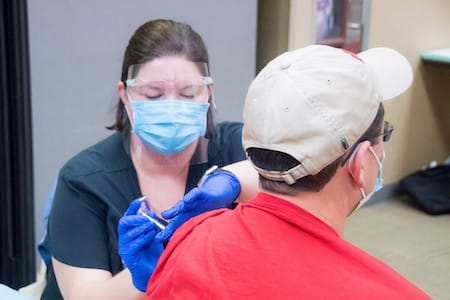
The continued spread of the virus and the arrival of new variants is an urgent reminder that this pandemic is not over yet. Right now, the Omicron variant is quickly becoming the dominant virus variant across the nation, and we know that this variant is highly infectious. One of the fundamental principles of this pandemic is that unvaccinated individuals have higher risk of severe disease and infection.
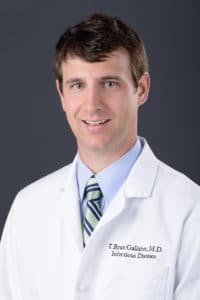
Dr. T. Ryan Gallaher
As has been the case with any variant, vaccination is highly effective at preventing the spread and reducing the severity of symptoms of those with breakthrough cases. If you have not had your booster or third dose of the vaccine, recent analysis of blood samples comparing boosted and non-boosted samples shows the extra dose is important to ensure better protection against the Omicron variant.
Additionally, we can have more confidence than ever regarding the safety of mRNA vaccines, even in children 5 and older. Vaccines for school-aged children are not new, and the COVID-19 vaccine should be part of that routine.
Recent data from October has shown unvaccinated individuals have five times higher risk of testing positive for COVID-19 and 14 times higher risk of death from COVID-19. Even more recent data from the Omicron surge in UK and South Africa has shown vaccine efficacy increases from 35% to 75% when a booster is given. After billions have been vaccinated around the world, it still holds true that the risks of COVID-19 far outweigh any risks of the vaccine. More studies have further shown mRNA vaccines do not affect fertility or be linked to any adverse pregnancy outcomes and, thus, continue to be safe and effective.
The longer you wait to vaccinate, the more likely you are to get the virus. Vaccination and boosters still largely protects from the Omicron variant, but we may not have that luxury if the virus continues to rapidly spread and mutate. Reports of adverse effects from the vaccines are rare, and you have a much higher chance of suffering critical outcomes from the virus as opposed to the vaccine.
Vidant Health offers vaccinations for anyone ages 5 and older. Additionally, Vidant Health is now administering boosters for those who are eligible. To receive your COVID-19 vaccine or booster, visit VidantHealth.com/Vaccine or call 252-847-8000.
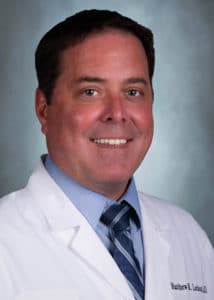
Dr. Matthew Ledoux
As a pediatrician serving eastern North Carolina, as well as a father to school-aged children, I truly appreciate the important role that in-person education has on the health and well-being of students. Schools are where children make lasting friendships, learn important social skills and receive a high-quality education that prepares them for life.
As we learned from the last school year, the only way we can keep our students in the classroom is to keep COVID-19 out of schools. That responsibility ultimately lies with parents and adults. With the Delta variant continuing to spread, even among children, we must do all we can to protect students by getting vaccinated, wearing a mask and practicing the common-sense safety measures that protect us all.
The Delta variant, which infects and presents serious symptoms in children at much higher rates than the original strain, is predominant in our community. In fact, it accounts for almost 100 percent of new COVID-19 cases detected through Vidant and ECU’s joint lab.
To protect our children and keep them in the classroom, it is crucial for everyone to wear a mask, especially if indoors and close together. Wearing a mask not only protects yourself, but also those around you. When all children are wearing masks in schools, only the person who tests positive for COVID-19 needs to go home and quarantine. If they are not wearing masks, the entire classroom, including the teacher, must be out to quarantine. Simply put, masks help keep kids in the learning environment.
In addition to masks, there are other measures we can take as parents to keep our kids safe. If your child is sick, keep them home. Do a quick symptom screener every morning to make sure they do not have a fever or any symptoms of COVID-19. Make sure your children routinely wash their hands and know how to properly wear masks.
If your child is eligible for the vaccine, get them vaccinated. If you are eligible, get vaccinated. Vaccines for school-aged children are nothing new, and the COVID-19 vaccine should be part of that routine if your child is eligible. Let’s do all we can to protect our community, keep our students in the classroom and give our children the best chance to succeed in their education.
For information on vaccines, please visit VidantHealth.com/vaccinate.
 The arrival of the COVID-19 vaccines brought great hope in the battle against the deadly pandemic that has affected our way of life for nearly a year and a half. Now, more than 7 months into the largest vaccination effort in history, the data and science is clear: the vaccines are effective, but only if people get their “dose of hope”.
The arrival of the COVID-19 vaccines brought great hope in the battle against the deadly pandemic that has affected our way of life for nearly a year and a half. Now, more than 7 months into the largest vaccination effort in history, the data and science is clear: the vaccines are effective, but only if people get their “dose of hope”.
The continued spread of the virus and the arrival of new variants is an urgent reminder that this pandemic is not over yet, and that we still have to assure vaccination for everyone to protect our communities. Right now, the Delta variant is quickly becoming the dominant virus variant. We know that this variant is easily spread and has many of the same devastating health impacts as previous variants. We also know that the vaccines are highly effective at both preventing the spread of the virus and drastically reducing the impact on those it infects.
It was not long ago that some hospitals around the country celebrated having zero COVID-19 patients in their Intensive Care Units. Doctors, nurses and other staff rejoiced at this welcomed respite. Here at Vidant, we never quite got to zero, but our numbers hit a new low in the spring. Now, hospitalizations are back on the rise and nearly all hospitalized COVID-19 patients – many of whom are battling for their lives – are unvaccinated.
As we have continued to learn more and more about this virus over the past year and a half, we can confidently say that ending up hospitalized with serious complications from COVID-19 is mostly avoidable now. The vaccines are safe, effective and widely available at local hospitals, clinics, health departments, pharmacies and more.
We can still see the light at the end of the tunnel but the Delta variant is dimming our view. Help us end this pandemic by receiving your COVID-19 vaccine as soon as possible by visiting VidantHealth.com/Vaccinate or by calling 252-847-8000.

